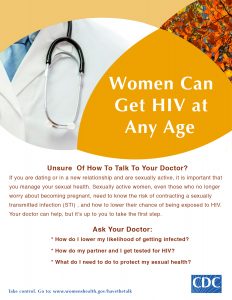The Effect of Health Agency Advertising on Patient-Doctor Communication
Health and Science
A woman’s willingness to initiate sexual health conversations with their doctors can make a difference in the quality of care she receives.
University of Florida College of Journalism and Communications Professor Cynthia Morton, Professor Emeritus Jon Morris and Sabrina Habib from the University of South Carolina, wanted to explore whether a woman’s age had any effect on her willingness to take the lead for her own sexual health care as opposed to allowing the doctor to lead conversations. The researchers also wanted to determine what emotional response, if any, women in different age groups had toward an advertisement about taking such agency.
Single women aged 25-70 were recruited to take an online survey that examined their sexual health agency, behaviors, and attitude toward patient-driven communication. The team created a print ad with visual and copy that presented women with a script to initiate conversation with their doctor. Talk points prompted women to apply talk points when talking to their doctor about strategies for lowering their risk of contracting HIV.

The study found that the ad stimulus was attention-getting and positively received. Study participants reported that it increased their intent to take additional steps to talk to their doctors and seek out resources for becoming educated about sexually transmitted diseases.
No statistical difference was found between the younger-aged women and mature-aged women on sexual health agency or their degree of empowerment in talking to their doctors. Sample participants already viewed themselves as full partners with their doctor on decisions relating to their sexual health. Nonetheless, a predominant reason driving women’s engagement with their doctor was the belief that the doctor is responsible for initiating the discussion of sexual health. When doctors set a tone appropriate for patient interaction, women were more likely to feel actively invested in the partnership.
Overall, the research continues to affirm that a sense of agency can be the difference between a patient’s increased knowledge of her own health and wellness strategies and exposure to health risks that could negatively affect her quality of life. This research also reinforces the effectiveness of sexual health advertising when it comes to encouraging women’s sense of health agency, regardless of age.
The original research paper, “What Women Want: The Effect of Health Agency Advertising on Patient-Doctor Communication,” appeared in the International Journal of Pharmaceutical and Healthcare Marketing, Volume 15, No. 3, 2021, 451-465.
Authors: Cynthia Morton, Sabrina Habib, Jon Morris
This summary was written by Marie Morganelli, Ph.D.
Posted: September 14, 2021
Insights Categories:
Health and Science
Tagged as: Cynthia Morton, Health Agency, Patient-Doctor Communication


